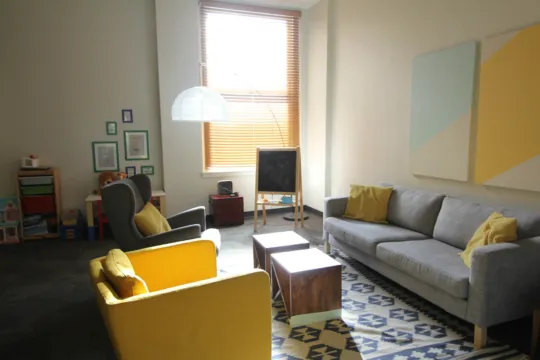Life Challenges
Relationships
Trauma and Healing
Therapy Methods
Body and Mind
This article focuses on the stereotypes Western culture places on men and women, and the effect on perception based on how someone appears in a counseling setting. However, there must also be examination (and more recent research) done on the stereotypes placed on individuals who do not fit the male and female binary.
About two thirds of therapists design their own therapy offices today. Many of these mental health counselors aim to elicit a feeling of acceptance, comfort, or welcoming.
Besides being warm and personable, therapists must also present a good professional impression to potential clients. It's important to appear credible to inspire confidence in the therapists' abilities. How, then, does one walk the line between comfort and credibility? No one wants a sterile, intimidating room that prevents clients from opening up; on the other hand, is it 'professional' to have an office that looks like a family's living room?
As it turns out, it may depend on the therapist.

Traditional vs humanistic
In a study comparing a stereotypical 'traditional' therapist office vs a 'humanistic,' softer office, the perceived credibility of the presumed therapist (who was not pictured nor in the room) changed dramatically.
When participants were told they were in the office of a male therapist, those in the soft, humanistic office condition formed the opinion that this male therapist was highly credible, but not so when they were told they were in a female therapist's office.
And, the opposite was true, as well. When in a 'traditional' office that read more professional rather than homey, the rated credibility of the therapist increased greatly when participants were told they were in a "female" therapist's office. "Male" therapists with the traditional office were seen as significantly less credible.

Sound unfair?
Well, yes. From the study's results, it appears that not only is the perception of a therapist's credibility affected by his or her office decor, but there is an interaction between the type of office decor and the therapist's gender. In other words, what works for male-identified therapists may not work for female-identified therapists.
However, this was all based upon the perception of a therapist that was never pictured or spoken with. It's possible that once presented with the actual counselor, the perceptions would change. And, first impressions don't last forever - as long as the initial session went well enough that the client returns.
If you are a therapist, listen to the new podcast Say More About That. A podcast created specifically for therapists to learn more about what clients really want in a counselor. In this episode Jolyn, a woman in her 40's saw her therapist for 10 years and grew in ways she never expected. To hear about her journey click play below or listen on Apple Podcast or Spotify.
Sources:
L. Bloom, R. Weigel, G. Trautt, Therapeugenic factors in psychotherapy: Effects of office decor and subject-therapist sex pairing on the perception of credibility, Journal of Consulting and Clinical Psychology 45(5):867-73 (1977).
Recommended Articles





